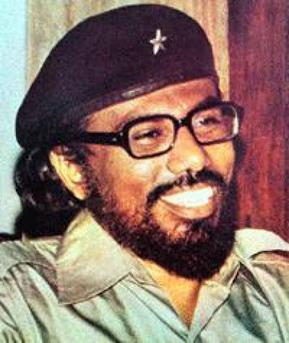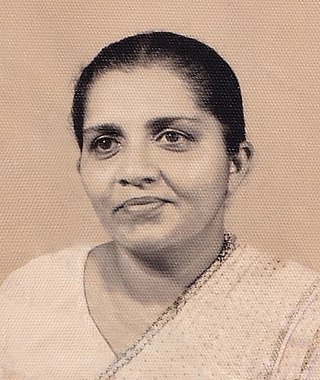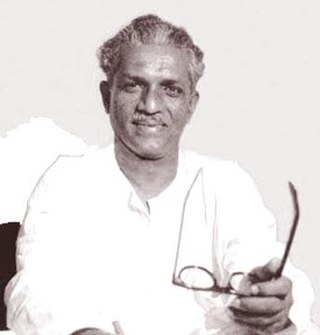Related Research Articles
Sirima Ratwatte Dias Bandaranaike, commonly known as Sirimavo Bandaranaike, was a Sri Lankan politician. She was the world's first female prime minister when she became Prime Minister of Sri Lanka in 1960. She chaired the Sri Lanka Freedom Party (SLFP) from 1960 to 1994 and served three terms as prime minister, two times as the chief executive, from 1960 to 1965 and from 1970 to 1977, and once again in a presidential system from 1994 to 2000, governing under the presidency of her daughter Chandrika Kumaratunga.
Bolshevik–Leninist Party of India, Ceylon and Burma (BLPI) was a revolutionary Trotskyist party which campaigned for independence and socialism in South Asia. The party was formed in 1942 as a unification of two Indian groups, with the Lanka Sama Samaja Party of Ceylon. It was recognised as the Indian section of the Fourth International.

The Lanka Sama Samaja Party, often abbreviated as LSSP, is a major Trotskyist political party in Sri Lanka. It was the first political party in Sri Lanka, having been founded in 1935 by Leslie Goonewardene, N.M. Perera, Colvin R. de Silva, Philip Gunawardena and Robert Gunawardena. It currently is a member of the main ruling coalition in the government of Sri Lanka and is headed by Tissa Vitharana. The party was founded with Leninist ideals, and is classified as a party with socialist aims.

Patabendi Don Jinadasa Nandasiri Wijeweera (Sinhala: පටබැඳි දොන් ජිනදාස නන්දසිරි විජෙවීර; 14 July 1943 – 13 November 1989, better known by his nom de guerreRohana Wijeweera, was a Sri Lankan Marxist political activist, revolutionary and the founder of the Janatha Vimukthi Peramuna. Wijeweera led the party in two unsuccessful insurrections in Sri Lanka, in 1971 and 1987 to 1989.
The Hartal 1953 was a country-wide demonstration of civil disobedience and strike, commonly known as a hartal, held in Ceylon on 12 August 1953. It was organized to protest against the policies and actions of the incumbent United National Party government. It was the first mass political action in Ceylon and the first major social crisis after independence. This event is of historical significance because it was the first people's struggle against an elected government in the country.
Nagalingam Shanmugathasan was a trade unionist and Maoist revolutionary leader in Sri Lanka. He was the General Secretary of the Ceylon Communist Party (Maoist)

Ceylon Communist Party (Maoist) is a political party in Sri Lanka. The party surged in 1964 following a split in the Ceylon Communist Party. Initially the party just called itself 'Ceylon Communist Party' as well, and was distinguished from the main CCP in Sri Lanka by denominations like 'Ceylon Communist Party (Peking Wing)', etc. In the end of the 1960s the party was one of the major leftist parties in the country. Initially Party was led by Premalal Kumarasiri and N. Shanmugathasan.

Violet Vivienne Goonewardene, commonly known as "Vivi", was a Sri Lankan anti-colonial activist and prominent politician, serving as one of the world's first female ministers. A key figure in both the Indian independence movement and the Sri Lankan independence movement, Goonewardene was a prominent member on the non-aligned stage, where she fought against perceived injustices and was critical of the Middle East diplomacy sponsored by the United States. Goonewardene was the first and, to date, only female National Hero of Sri Lanka. By her death, she was one of the Left's most vibrant personalities, and the foremost female figure in the Sri Lankan leftist movement.

Edmund Peter Samarakkody was a Ceylonese lawyer, trade unionist, politician and Member of Parliament.
The Ceylon Mercantile Union (CMU) is one of the largest trade unions in the commercial sector in Sri Lanka.
The Ceylon Federation of Labour (CFL) is an organisation bringing together trade unions in the private, semi-government and co-operative sectors of Sri Lanka.

Don Philip Rupasinghe Gunawardena was a Sri Lankan Marxist politician and leftist. A founder of the Lanka Sama Samaja Party, the first political party in Ceylon which was known for having introduced Trotskyism, he later formed the Mahajana Eksath Peramuna and was called 'the Father of Socialism' and as 'the Lion of Boralugoda'. A member of the State Council of Ceylon and the Parliament of Ceylon, he served as the Minister of Agriculture and food under S. W. R. D. Bandaranaike from 1956 to 1959 and as Minister of Industries and Fisheries in the national government under Dudley Senanayake from 1965 to 1970.
Forward was an English-language weekly newspaper published from Colombo, an organ of the Communist Party of Sri Lanka. Forward was one of few political party-affiliated publications printed in English in Sri Lanka at the time.

Leslie Simon Goonewardene was a prominent Sri Lankan statesman. He founded Sri Lanka's first political party, the Lanka Sama Samaja Party, in 1935, and served as its General-Secretary from 1935 to 1977. Goonewardene was a key figure in both the Indian independence movement and the Sri Lankan independence movement. He was designated as a National Hero of Sri Lanka for his leadership in the independence movement, and his efforts are celebrated each year on the Sri Lankan Independence Day.
Weerahennedige Theodore Wilfred Meryl Fernando was a Ceylonese teacher, trade unionist, politician and Member of Parliament.
Merengna Gaulius Mendis was a Sri Lankan trade unionist and a member of the Parliament of Sri Lanka.
Watson Fernando was a Sri Lankan communist politician and trade unionist. He served as president of the Ceylon Communist Party and was a member of the Moratuwa Municipal Council.

The Communist Party of Sri Lanka (Marxist-Leninist) was a political party in Sri Lanka. The party originated in a split in the Ceylon Communist Party, as tension had risen between N. Shanmugathasan and Watson Fernando. On September 22, 1972 the N. Shanmugathasan-led Central Committee of CP(P) declared Fernando and fellow CC members Ariyawansa Gunasekara and V.A. Kandasamy expelled. On November 12, 1972 Fernando's group declared itself as the CPSL(M-L).
Ajith Rupasinghe Surendra was a Sri Lankan political activist.
Communism in Sri Lanka dates back to 1935, when the Lanka Sama Samaja Party was founded by Trotskyists who campaigned for freedom and independence of Sri Lanka which was then a colony of the British Empire and known as Ceylon.
References
- ↑ Geoffrey Jukes (1973). The Soviet Union in Asia . University of California Press. p. 139. ISBN 978-0-520-02393-2.
- 1 2 3 4 The Island. M.G. Mendis in his Heyday
- ↑ Sunday Observer. Buddhist Monks Heroes of Sri Lanka’s Freedom Struggles
- ↑ Stanley Jeyaraja Tambiah (15 July 1992). Buddhism Betrayed?: Religion, Politics, and Violence in Sri Lanka. University of Chicago Press. p. 16. ISBN 978-0-226-78949-1.
- ↑ Charles A. Gunawardena (2005). Encyclopedia of Sri Lanka. Sterling Publishers Pvt. Ltd. p. 215. ISBN 978-1-932705-48-5.
- ↑ Robert N. Kearney (1971). Trade Unions and Politics in Ceylon . University of California Press. p. 22. ISBN 978-0-520-01713-9.
- 1 2 3 Richard L. -G. Deverall; American Federation of Labor. Free Trade Union Committee (1950). Report on labour in Ceylon, submitted to Free Trade Union Committee, American Federation of Labour. pp. 43, 50.
- 1 2 3 Robert N. Kearney (1971). Trade Unions and Politics in Ceylon . University of California Press. p. 77. ISBN 978-0-520-01713-9.
- ↑ Nira Wickramasinghe (2006). Sri Lanka in the Modern Age: A History of Contested Indentities. University of Hawaii Press. p. 226. ISBN 978-0-8248-3016-8.
- ↑ Marxists.org. To All Marxist-Leninists Inside the Ceylon Communist Party
- ↑ Robert N. Kearney (1971). Trade Unions and Politics in Ceylon . University of California Press. p. 45-47. ISBN 978-0-520-01713-9.
- ↑ S. Janaka Biyanwila (18 October 2010). The Labour Movement in the Global South: Trade Unions in Sri Lanka. Routledge. p. 50. ISBN 978-1-136-90426-4.